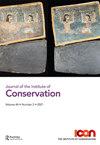英国遗产保护中缺乏黑人和少数民族代表,以及包含不同声音的价值
IF 1
0 HUMANITIES, MULTIDISCIPLINARY
引用次数: 3
摘要
摘要英国遗产保护专业人员的人口统计目前表明,边缘化个人的代表性明显不足。本文主要旨在通过解决导致排斥、不公平和不可接近制度的一些具体问题和障碍,提高人们对保护中缺乏黑人和少数民族多样性的认识,并探讨其想法。至关重要的是,它将确定为什么在遗产环境中包含和保留这些不同的声音特别有价值。讨论得到了最近的研究、报告和事件的支持,包括作者自己的一些生活经历,以便读者能够承认和理解一些问题的直接、真实和第一手影响。最终,这篇文章试图帮助继续推动积极的社会变革。本文章由计算机程序翻译,如有差异,请以英文原文为准。
The absence of black and ethnic minority representation in UK heritage conservation and the value of including diverse voices
Abstract The demographic of UK heritage conservation professionals currently demonstrates a clear under-representation of marginalised individuals. This article principally aims to raise awareness and explore ideas on the lack of black and minority ethnic diversity in conservation by addressing some of the specific issues and barriers that cause systems of exclusion, inequity and inaccessibility. Crucially, it will establish why it is particularly valuable to include and retain these diverse voices in heritage environments. Discussions are supported by recent studies, reports and events, including some of the author’s own lived experiences so that readers can acknowledge and understand the direct, real and first-hand impact of some of the issues. Ultimately, the article seeks to help continue the drive for positive social change.
求助全文
通过发布文献求助,成功后即可免费获取论文全文。
去求助
来源期刊

Journal of the Institute of Conservation
HUMANITIES, MULTIDISCIPLINARY-
CiteScore
1.50
自引率
0.00%
发文量
22
期刊介绍:
The Journal of the Institute of Conservation is the peer reviewed publication of the Institute of Conservation (Icon). As such, its aims reflect those of Icon, to advance knowledge and education in conservation and achieve the long term preservation and conservation of moveable and immoveable cultural heritage. The Journal provides a collective identity for conservators; it promotes and supports both the profession and professionalism. With international contributions on all aspects of conservation, it is an invaluable resource for the heritage sector. The specific aims of the Journal are to: 1. promote research, knowledge and understanding of cultural heritage conservation through its history, practice and theory 2. provide an international forum to enable and disseminate advances in research, knowledge and understanding relating to conservation and heritage 3. champion and support professional standards of heritage conservation in the UK and internationally 4. provide a permanent record of issues relating to conservation and heritage 5. be financially and operationally sustainable. To achieve these aims, the Journal invites contributions from all those involved in the conservation of cultural heritage and related activities. Areas of interest include understanding cultural heritage materials and their degradation; subject reviews and histories of cultural heritage materials and conservation treatments; new, innovative or improved approaches to conservation and collections care theory, practice, communication, management and training; case studies demonstrating new, innovative or improved approaches; and conservation in its wider context. Submitters are encouraged to demonstrate how their work is of practical application to conservation. To maintain professional standards and promote academic rigour, submissions of articles and shorter notices are subject to an anonymous peer review process.
 求助内容:
求助内容: 应助结果提醒方式:
应助结果提醒方式:


